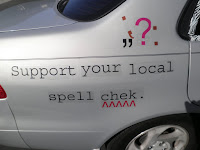 Arnold Schwarzenegger, Anthony Weiner, Tiger Woods, David Letterman, Jesse James, Bill Clinton, John Edwards, Jon Gosselin, Ryan Philippe, Mel Gibson, Hugh Grant, Ethan Hawke…
Arnold Schwarzenegger, Anthony Weiner, Tiger Woods, David Letterman, Jesse James, Bill Clinton, John Edwards, Jon Gosselin, Ryan Philippe, Mel Gibson, Hugh Grant, Ethan Hawke…If goddess-like Uma Thurman’s husband sleeps with the nanny, the chances of finding a monogamous man seem pretty bleak, don’t they?
Well, cheer up, ladies; it’s not a bad as you think. A new study shows that the gender cheating gap is closing. Women are reportedly cheating almost as much as men.
Isn’t that great news? I love equality! High five LeAnn Rimes! Way to go J.Lo!
All this sleeping around really helps me understand an issue that I’ve been struggling with for quite a while. You see, I’ve always known that mixing up the words lose and loose is a common error. What I could never understand was why we tend to overuse loose. People more often use loose when they should be using lose rather than the other way around.
Now it makes sense. Because everyone is so sexually loose, they are subconsciously expressing it when they write.
Don't give yourself away through your writing. When you use the word loose, make sure you mean one of the following things:
Not tight-fitting:
I had to take off my wedding ring because it was too loose.
Imprecise:
We loosely adhere to our wedding vows.
Promiscuous:
Men and women are equally loose.
Now, if you’ll excuse me, I have to let my husband out of his cage for dinner. In this promiscuous climate, I simply can't risk letting him loose.












 On our drive up to San Francisco, my husband and I stopped to have lunch in the college town San Luis Obispo. Three college students were sitting at the table next to us, and one of them asked the others, “What are you going to wear to the ‘90s party this weekend?”
On our drive up to San Francisco, my husband and I stopped to have lunch in the college town San Luis Obispo. Three college students were sitting at the table next to us, and one of them asked the others, “What are you going to wear to the ‘90s party this weekend?”


